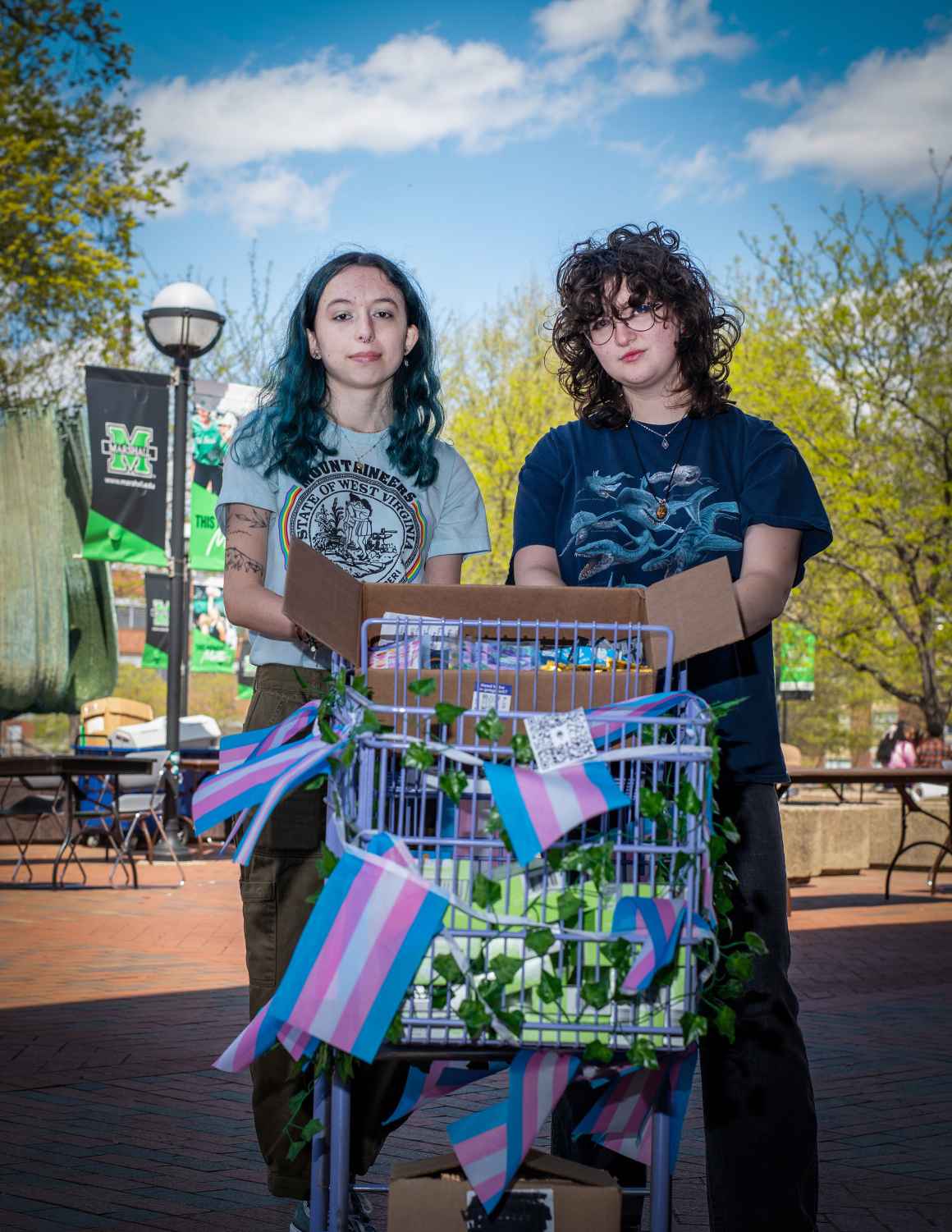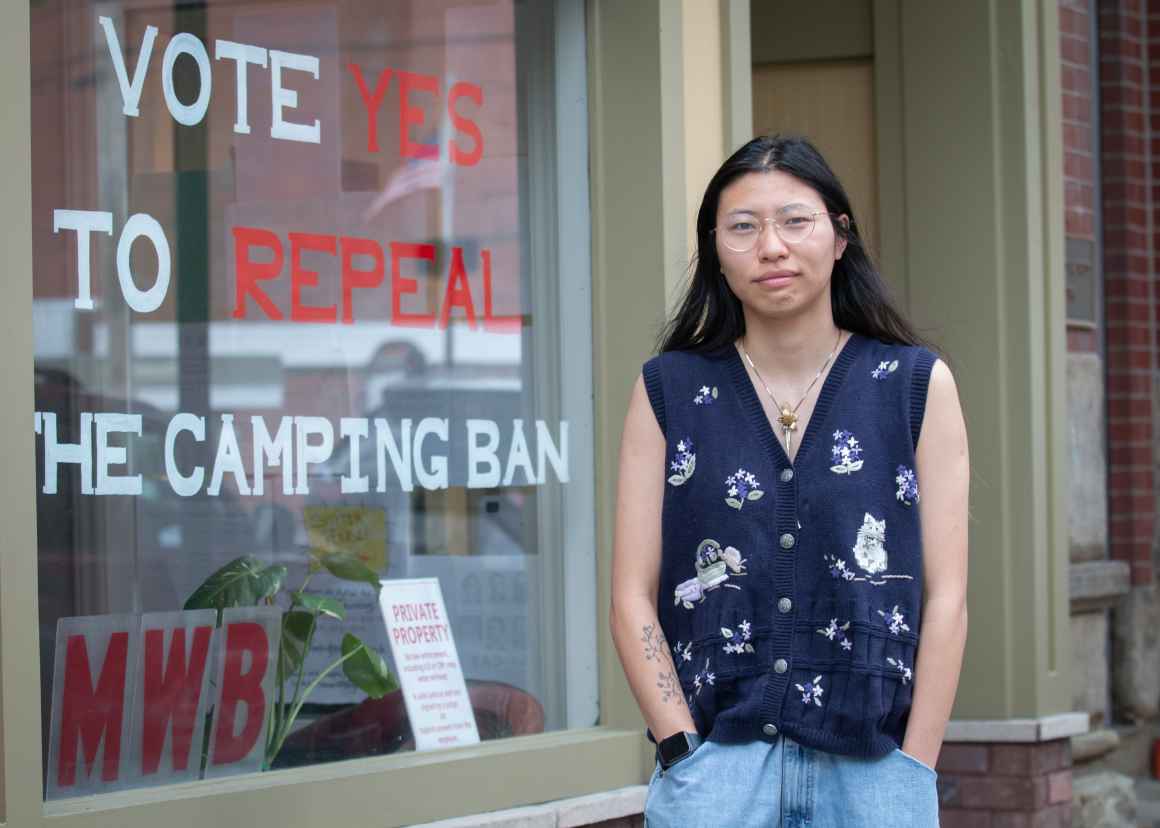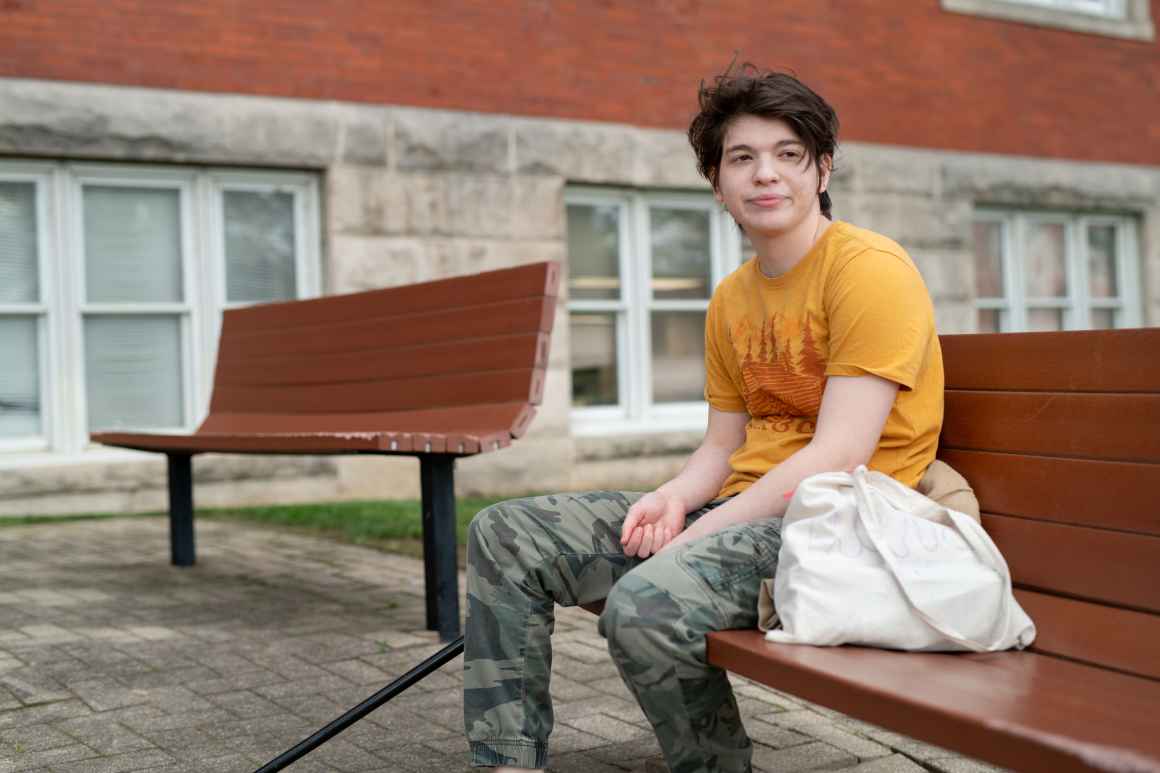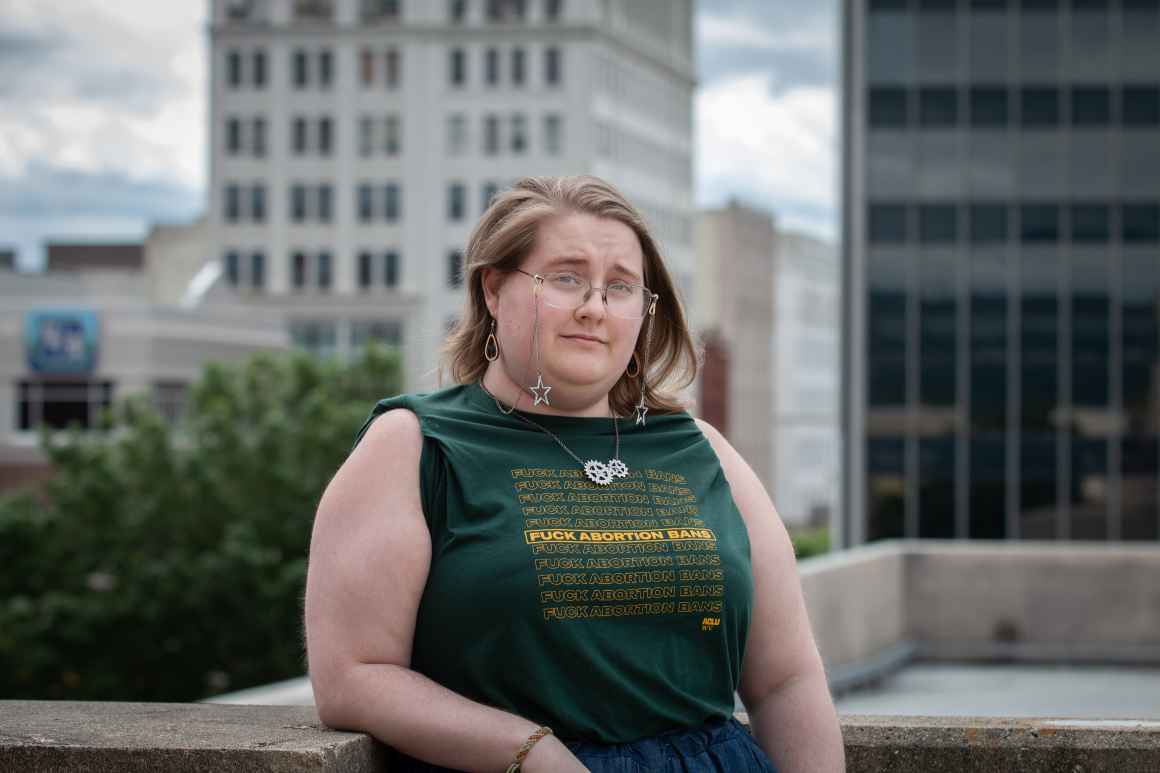THE ACTIVIST GENERATION: Cultivating the next wave of advocates
Young West Virginians are rolling up their sleeves and carving out spaces where progressive communities can take root and flourish despite the difficult terrain.

As Marshall University students prepared for finals this spring, a lavender shopping cart filled with contraceptives, drug test strips, and resource guides clattered along the sidewalk behind the student center.
“Buggy,” as the shopping cart is affectionately called, is brought onto campus every Wednesday by Gray Howell and Emma Whetzel, two 20-year-old university students.
The pair took up the Appalachian Liberation Collective project when its founders graduated the year before.
"We're not discriminatory," Howell said. "We give out supplies to anyone who needs it."
Buggy’s weekly presence on campus represents part of a new approach to organizing. In addition to asking for votes and organizing protests, young organizers across the state are creating spaces for their peers to share resources and a space to grow with one another.
Finding Their Voices
For many young activists in West Virginia, the path to organizing begins with personal transformation.
"I was a profound Christian," said Mailyn Saddler, 23, who grew up in Lincoln County. "In another world, would have been a fucking megachurch pastor."

Saddler grew up deeply conservative but had a realization as a freshman in high school about empathy and a God that would judge her queer friends.
“I had a lot of gay friends in high school. Pretty impressive for a conservative little shit. And I just remember thinking none of these people actually deserve to go to hell. They’re good people.”
Saddler decided, “If this is a hang-up this God has, I don’t want to serve him. Send my ass to hell.”
Soon, they joined Young Democrats, working on progressive campaigns, and eventually helped lead student protests at West Virginia University that garnered international press attention. Saddler is currently ACLU-WV’s Equity and Justice fellow.
For Lloid Hoffman, a 20-year-old environmental science major at Marshall University, the path to organizing was informed by the intersection of being gay and having a stutter that makes speaking (and sometimes even breathing) challenging.

Taking long pauses between words, Hoffman explained "Stuttering hurts. I can't breathe as I stutter, and it's really hard. I struggle with it every day."
But rather than letting this barrier silence him, Hoffman found alternatives. Through ACLU-WV’s Appalachian Queer Youth Summit, Hoffman began studying American Sign Language and learned how to help organize protests without having to be the person delivering speeches from behind a podium.
At a recent campus protest against Gov. Patrick Morrisey’s executive order attempting to end diversity, equity, and inclusion programs, Hoffman helped make signs and invite people. He also wrote a speech for a fellow advocate to read a legislative hearing on a law seeking to ban gender-affirming care.
"Just being there is a message in itself," Hoffman said.
Mutual Aid as Movement-Building
Creating spaces and providing resources for each other are essential components of mutual aid – an organizing concept that calls on people to show up for each other’s needs. Mutual aid is at the core of how young people in West Virginia are organizing for political change.
Prior to working full time for ACLU-WV as organizers, Sam Green, 24, and Oceanna Smith both got their start by meeting the needs of their college classmates.
Green started the tradition of carting around Buggy on Marshall’s campus with friend (and former ACLU-WV employee) E Bowen under the moniker Appalachian Liberation Collective.
“A friend that was in the club brought her to campus one day as a joke after finding her on the streets, and abandoned her at the student center. E and I took her to my apartment bc we thought it was funny, and they realized they had pink spray paint, so we painted her as a joke. Then we realized how helpful it’d be for us to transport the supplies, so we started doing that and ended up decorating her more when people fell in love with her (which happened at a protest when anti-abortion folks came to campus and we had a counter protest. E and I filled her with plan B and taped a sign to her that said “get off my campus fascist” and after that everyone knew her as “the all pronouns buggy” or “plan B buggy”)
"Giving out Plan B was also kind of an accident. I ran into a reproductive rights advocate after Roe was overturned, and she was like, 'I have a ton of Plan B that's about to expire. Can you give that out to college students?' Ever since then, groups like Holler Health Justice and the Women’s Health Center of West Virginia have made sure students have access to supplies to hand out.”
What began as an improvised response to a crisis evolved into a sustainable model of community care. Students know they can always access condoms and plan B on Wednesdays behind the student center.
“Today is actually kind of slow because I think we’ve just saturated the need which is good to see,” Howell said while standing next to the same shopping cart full of supplies that Green began pushing years ago on the campus.
At West Virginia Northern Community College, Smith started a similar program, providing community meals, menstrual products in bathrooms, and Narcan training and Fentanyl test strips.
“At community college, you have a really diverse student body. There are people coming back to school after raising kids, high school dropouts, people who are on grants where they have to be drug-tested to get tuition. So, we were just looking for ways we could make their lives easier,” Smith explained.
Smith said that in addition to providing material resources to people, creating a space for people to feel cared for and respected is its own kind of resource.
“Not only is it super conservative, but West Virginia is rural. And that just makes for hard organizing and that makes for feelings of isolation and I think the real work in organizing in West Virginia is combating isolation.
Howell and Whetzel said it’s not just the people who come to Buggy once, but come back that show them they’re making a difference. Howell recalled, “A girl came back up to me when I was tabling a few weeks after first stopping by. She said thanks to me and the information I had given her, she's now on birth control. And it's going great, and she doesn't have to pay for it."
An Innate Need to be Helpful
Jaye Hicks’ father always said not to get a cubicle job because it “will suck the life out of you.”
But Hicks, who is 22 and uses they/she pronouns, has always been drawn to administrative and support work.

“Physically getting out there, like to a protest, can be hard for me,” said Hicks, who uses a mobility aid to walk. “I love administrative stuff, behind-the-scenes stuff, because I’ve always had an innate urge to be helpful. It’s nice to be able to push for change from the comfort of my office chair.”
Hicks has worked in the ACLU-WV office since December 2023 performing a varied assortment of tasks.
If you’ve received a know-your-rights pocket guide, Hicks probably either cut and folded it or organized volunteers who did so. If you’ve received a thank you card for your donation, Hicks probably wrote it. When we charter buses to Washington, D.C. she serves as bus captain, taking attendance and making sure everyone stays fed, hydrated, and accounted for. They also help the communications team run the social media accounts for the Summit, among numerous other responsibilities.
Hicks recalls moments of their childhood when they caught glimpses of injustice, like when they and their grandfather were accosted by a stranger because of the rainbow bumper sticker on her grandfather’s car. But it was being part of the inaugural class of the Appalachian Queer Youth Summit that catapulted Hicks into advocacy.
At 16 their mother called them over to look at an ad on Facebook for the summit, which is a summer camp for LGBTQ+ high schoolers in West Virginia who want to learn more about advocacy. At first, Hicks said no thanks, but mom persisted.
“It turned out to be the best decision I’ve ever been shoved into,” they said with a laugh.
The first camp was virtual due to the COVID-19 pandemic, but it was still a moving experience for Hicks.
“I was like wow this is what a community is like. I’d never seen it before,” they said.
Hicks then got involved as an ambassador for the camp, traveling to pride festivals across the state with ACLU-WV staff to spread the word and recruit more campers.
“I’m not great at face-to-face interaction. I stumble through my words sometimes, but I listened to people at the next table over talk about their organization and I just kind of turned it into a format for a speech about the camp,” they said. “I gave that speech over and over until we had a bunch of signups and I had lost my voice.”
When the first in-person camp finally arrived, Hicks was still admittedly nervous. But when she arrived, a group of campers was already sitting in a circle in a field making friendship bracelets.
“It was like walking into a room full of people you already knew, who had been waiting for you,” they said.
In addition to Hicks’ work at the ACLU-WV office, she also has served as a junior counselor at the camp and plans to be a counselor for the 2025 summit.
And although she isn’t in a cubicle, Hicks said this desk job and the work it supports hasn’t sucked out her soul. Not by a long shot.
“In fact, I think this work gave me back the soul I was missing,” she said.
Combatting Hostility and Apathy with Resilience and Joy
The non-stop attacks on marginalized people by West Virginia lawmakers stoke fear and hurt in the communities they target. But they also drive a strong sense of hopelessness, Smith said. "A lot of times shit just gets so bad here that young people just shut down. Rather than getting angry, they just feel apathy because they feel powerless. And you can't get mad at the apathy because it's self-preservation."
Recent years have seen politicians in West Virginia double down on the culture wars. The state’s most recent gubernatorial race was a competition of who could cry the loudest about trans people in bathrooms and sports. And this year’s legislative session saw the Republican supermajority in the legislature add migrants to the list of communities they know nothing about but feel the need to target with hostile legislation.
"If I'm honest, it fucking sucks," Sam says of organizing around progressive issues in the state. "We went from the trans athlete ban that impacted a tiny population of trans kids in the state to them wanting to take healthcare away from trans kids to this legislative session where the attacks went all the way to kids getting forcibly outed at school."
To combat this despair, these organizers focus on building spaces for communities they serve. Green helped found the West Virginia Trans Coalition, creating a network of support for trans people across the state. Smith helped start an annual BIPOC (Black, Indigenous, and People of Color) Convening.
"When we're in a room together, we can feel the power," Ocean said. “But, we don't have that opportunity very much. So, we have to create these spaces ourselves.”
Despite the challenges — or perhaps in spite of them — Green and Smith emphasized the importance of finding joy in their work. "
These kids are really funny," Ocean notes. "I see a through line of young people, including myself and Sam, that we want to laugh more than we cry no matter what is happening."
For Green, watching the resilience of today's youth is inspiring.
"I look at these kids and I think about how terrible I felt when I was in high school, like hardly surviving, and they're more resilient than I even was," Sam says. "I am constantly impressed by their ability to cut through how terrible things are, to connect with each other in a place that comes from love, that comes from joy."
Taking Root
When Green graduated from Marshall, he no longer had time and access to campus to continue with Buggy. But when school picked back up the next year, its presence was missed. Concerned about continuing the efforts, Howell and Whetzel reached out.
"When I noticed that neither of them was there, I contacted Sam," Howell explained. "You see this wonderful thing and then it's gone, and you feel that gap. You feel the hole in the community that's been left."
Similarly, Smith still sees mutual aid programs they started at Northern Community College continuing years later.
"They have menstrual product drives every semester," Ocean said with pride. "I'm still on their Snapchat, so I see and I'm like, 'Oh, I did that!'"